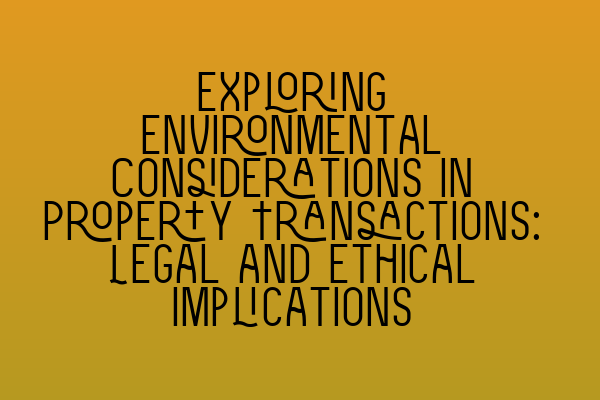Exploring Environmental Considerations in Property Transactions: Legal and Ethical Implications
When it comes to property transactions, there are numerous legal and ethical considerations to take into account. One area that has become increasingly important is the impact of environmental factors on the property and surrounding areas. In this article, we will delve into the legal and ethical implications of environmental considerations in property transactions, and explore why it is crucial for solicitors and property professionals to be well-versed in this area.
Environmental Due Diligence
In any property transaction, conducting thorough due diligence is essential. This includes investigating potential environmental risks or issues associated with the property. By assessing the environmental status of the property, solicitors can ensure that their clients are fully informed about any potential risks or liabilities that may arise from environmental concerns.
Environmental due diligence involves conducting site inspections, reviewing historical records, and assessing potential contamination risks. This process helps identify any environmental problems that may impact the property or pose future liabilities. It is vital to engage qualified professionals, such as environmental consultants or surveyors, to assist with this process.
To learn more about due diligence in property transactions, consider reading our comprehensive guide on SQE 1 Practice Exam Questions.
Legal Implications
From a legal standpoint, environmental considerations in property transactions are governed by various laws and regulations. Legislation such as the Environmental Protection Act 1990 and the Water Resources Act 1991 outlines the responsibilities of property owners and developers when it comes to environmental protection.
When conducting property transactions, solicitors must ensure compliance with these laws and regulations. Failing to address environmental issues can lead to legal consequences, including fines, penalties, and even potential legal disputes in the future. Therefore, it is critical for solicitors to have a thorough understanding of the legal framework surrounding environmental considerations in property transactions.
For further guidance on preparing for SQE exams, check out our SQE 1 Practice Mocks FLK1 FLK2 and our SQE 2 Preparation Courses.
Ethical Considerations
Alongside legal obligations, there are also ethical considerations when it comes to environmental issues in property transactions. Responsible and sustainable development has become a key aspect of property transactions in recent years. This involves considering the long-term environmental impact of a property and ensuring that it is developed in an environmentally sustainable manner.
As solicitors, it is essential to advise clients on the ethical implications of their property transactions. This includes encouraging environmentally-friendly practices, such as using sustainable building materials, implementing energy-efficient systems, or preserving natural habitats on the property. By promoting ethical considerations, solicitors can play a crucial role in shaping responsible and sustainable property development.
For individuals looking to pursue a career in property law, it is essential to understand the legal and ethical implications of environmental considerations in property transactions. By having a strong foundation in this area, solicitors can provide comprehensive advice to clients and ensure compliance with relevant laws and regulations.
If you’re interested in learning more about the SQE exams and their dates, be sure to visit our article on SRA SQE Exam Dates.
Conclusion
Environmental considerations have become a critical aspect of property transactions, both from a legal and ethical standpoint. Solicitors and property professionals must be well-versed in this area to ensure compliance with regulations and to promote responsible and sustainable development. Conducting thorough due diligence, understanding the legal framework, and considering the ethical implications are all essential steps in managing environmental considerations in property transactions.
